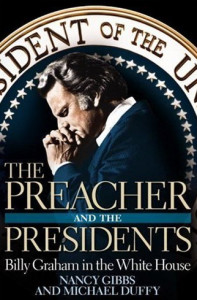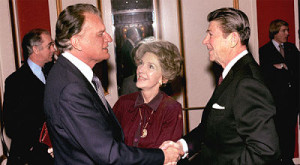 In preparation for my upcoming year of sabbatical when I will be doing some research at presidential libraries, I’ve been reading as much as I can about those who were spiritual advisors to presidents. The obvious first choice for study is Billy Graham. Recently, I finished a book that provided some really excellent and even profound insights into Graham’s relationships with presidents from Truman to George W. Bush. Elegantly written by journalists Nancy Gibbs and Michael Duffy, The Preacher and the Presidents: Billy Graham in the White House is a treasure chest of information about how Graham saw his role as pastor to presidents and how presidents utilized him in their administrations.
In preparation for my upcoming year of sabbatical when I will be doing some research at presidential libraries, I’ve been reading as much as I can about those who were spiritual advisors to presidents. The obvious first choice for study is Billy Graham. Recently, I finished a book that provided some really excellent and even profound insights into Graham’s relationships with presidents from Truman to George W. Bush. Elegantly written by journalists Nancy Gibbs and Michael Duffy, The Preacher and the Presidents: Billy Graham in the White House is a treasure chest of information about how Graham saw his role as pastor to presidents and how presidents utilized him in their administrations.
I learned more about Graham than I expected. Personally, I’ve followed Graham’s evangelistic career since the mid-1960s. I remember vividly the telecasts of some of his crusades while I was still in high school, as well as reading his early autobiography. He played a significant part in my budding faith at that time.
Later, I branched out into other avenues for growing in my spiritual walk, but he was always there in the background. In the 1980s, when Graham went to China for the first time, a couple I knew at the church I was attending was connected with that endeavor. They turned to me to write a paper on the value of a market economy and freedom. That paper then went with Graham to China as part of his mission to the Chinese leaders. I felt quite honored to take part in that, even in a small way.
 Reading the book, I came away with a deeper appreciation for just how influential Graham has been in American society throughout his long ministry. His connections with presidents were often instrumental in forwarding the Gospel, particularly in many communist nations. That occurred primarily during Reagan’s tenure. Reagan was a great supporter of Graham’s ministry; he had known him personally since the early 1950s. One comment in the book intrigued me: Graham described Reagan “as the president he was closest to—and the one he would have liked to have known better. Nancy Reagan said her husband’s relationship with Graham deepened when he became president. ‘Their relationship was beyond political,’ she said in 2006. ‘Billy would keep in touch with Ronnie on all levels.'”
Reading the book, I came away with a deeper appreciation for just how influential Graham has been in American society throughout his long ministry. His connections with presidents were often instrumental in forwarding the Gospel, particularly in many communist nations. That occurred primarily during Reagan’s tenure. Reagan was a great supporter of Graham’s ministry; he had known him personally since the early 1950s. One comment in the book intrigued me: Graham described Reagan “as the president he was closest to—and the one he would have liked to have known better. Nancy Reagan said her husband’s relationship with Graham deepened when he became president. ‘Their relationship was beyond political,’ she said in 2006. ‘Billy would keep in touch with Ronnie on all levels.'”
There were pitfalls along the way for Graham as he learned how to handle his fame and influence with presidents. His closeness to Richard Nixon also tied him to Watergate, even though he was in no way involved in that scandal. It taught him to be more cautious in future dealings, yet he never shied away from offering pastoral counseling and comfort to any president—and any other person—who sought him out.
Over this next year, I’ll not only visit presidential libraries, but I’ll travel to Wheaton College to examine Billy Graham’s papers. I also hope to make a trek, along with a colleague on this project, to North Carolina to interview Graham family members and associates. While it would be wonderful to get to see Billy Graham and talk with him, that probably won’t happen. His age and infirmities make that unlikely.
Graham’s ministry has ended now, for all practical purposes. He knows he doesn’t have much more time on this earth, but that doesn’t bother him. He has the assurance of an eternity with the One he has served faithfully all these years. It will be a pleasant experience to spend time this year getting to “know” him better.
